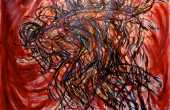Jack Walton
Jack Walton is a musician and an academic who studies and writes about creative practices.
Junior Contributor II
- Sharp-Eyed Citizen
- ?
- Articles
1 - Featured
0 - Comments
12
- Ext. Comments
3 - Processed
3 - Revisions
2
- Topics
3 - Topics Taken
1 - Notes
2
- Topics Proc.
2 - Topics Rev.
0
- Points
187 - Rank
X - Score
96
Latest Articles
Latest Topics
Materiality in Writing Practices: What matters?A common point of difference in commentary on literary craft is the role of tools: the pens, the paper, the word processors, and other ephemera through which writing actually happens. Some authors, such as Neil Gaiman, famously write in beautiful notebooks with beautiful pens, while others take the opposite approach. Natalie Goldberg, for instance, has written of her preference for a fast-writing cheap pen and an inexpensive notebook, on the basis that such tools put little pressure on the author to produce perfect work. While it seems reasonable that personal preference plays an important role, how can aspiring writers think more critically about their choice of creative implements? Of the resources at our disposal, which are likely to support the creative process, and under what conditions? Conversely, under what conditions might we consider a writing practice to be ill-resourced, and what are the telltale symptoms of such a situation?
|
Past, Present, and Future: Exploring the Literary Effects of TenseThe contemporary popularity of the present tense in narrative storytelling has been critiqued by authors such as Philip Pullman, who have argued a preference for the tone associated with the past tense. Popularised by figures such as Jane Austen, the past tense can be used to achieve a 'classic' tone in narrative writing; today, however, authors are freely experimenting with tense. This article will address how, in today's world, the aspiring author make sense of tense. Is it a matter of personal preference, or do choices of tense play into more complex sociocultural aesthetics? If tense matters, how important is it to take a stance on the subject? Is tense a purely relativist construct, its validity being subject predominantly to the whims of the author?
|
On the Revision Practices of ArtistsArtists in various disciplines sometimes comment on the process of working from an initial idea toward published versions of their works. For those learning in the arts, one powerful message within such commentary is the general commonality and value of leaning into a practice of improvement over time through successive revisions of a work. This could be contrasted against the notion some students have that great works emerge relatively whole and complete most of the time. The author of this article could review the revision practices of various established artists, comparing their similarities and differences. The article could restrict itself to a single discipline (e.g. a certain type of writing), or could take a multi-disciplinary view.
|
Latest Comments
| Movement and Location: A Brief Comment on Meaning in the Literary Experience | |
Thanks for this comment. Another of Chesterton’s pieces which I love (‘A Piece of Chalk’) gets at a similar idea, on the theme of using place as a resource for encouraging interpretive conceptions of the world around us (including in other art forms). | Movement and Location: A Brief Comment on Meaning in the Literary Experience |
Thanks for your comment—I’m not sure of any texts that attend to tourism more specifically, but hopefully others here can recommend something. I’d also be interested to know what can be found. | Movement and Location: A Brief Comment on Meaning in the Literary Experience |
I agree; the line between literary theory and ‘creative’ theory in general seems easily blurred. | Movement and Location: A Brief Comment on Meaning in the Literary Experience |
Thanks Gabriella! | Movement and Location: A Brief Comment on Meaning in the Literary Experience |
Thanks Imani! | Movement and Location: A Brief Comment on Meaning in the Literary Experience |
Thanks for your comment! I found the additional commentary in the most recent edition of Writing Down the Bones very helpful for processing the original book. | Movement and Location: A Brief Comment on Meaning in the Literary Experience |
Added to the other suggestions here, and on the theme of the article, Chesterton’s Tremendous Trifles is a wonderful collection, both poetic and informative. Alice LaPlante’s The Making of a Story (also a Norton text) offers a really nice unity of theoretical content, readings, and practical exercises. | Movement and Location: A Brief Comment on Meaning in the Literary Experience |

I’m tempted to respectfully disagree a little (though not entirely) on this point. No practice can be entirely absent of theory, and most domains in which expertise exists involve a curation of methodology, even where the method is left tacit to outward appearances. This is one reason for which many prominent individuals in creative domains make clear claims about the existence of rights and wrongs in creative practice.
I do agree that deep immersion is essential for developing one’s capability to recognise quality, however the creative arts are not without their principles, and some of these can be taught quite easily.